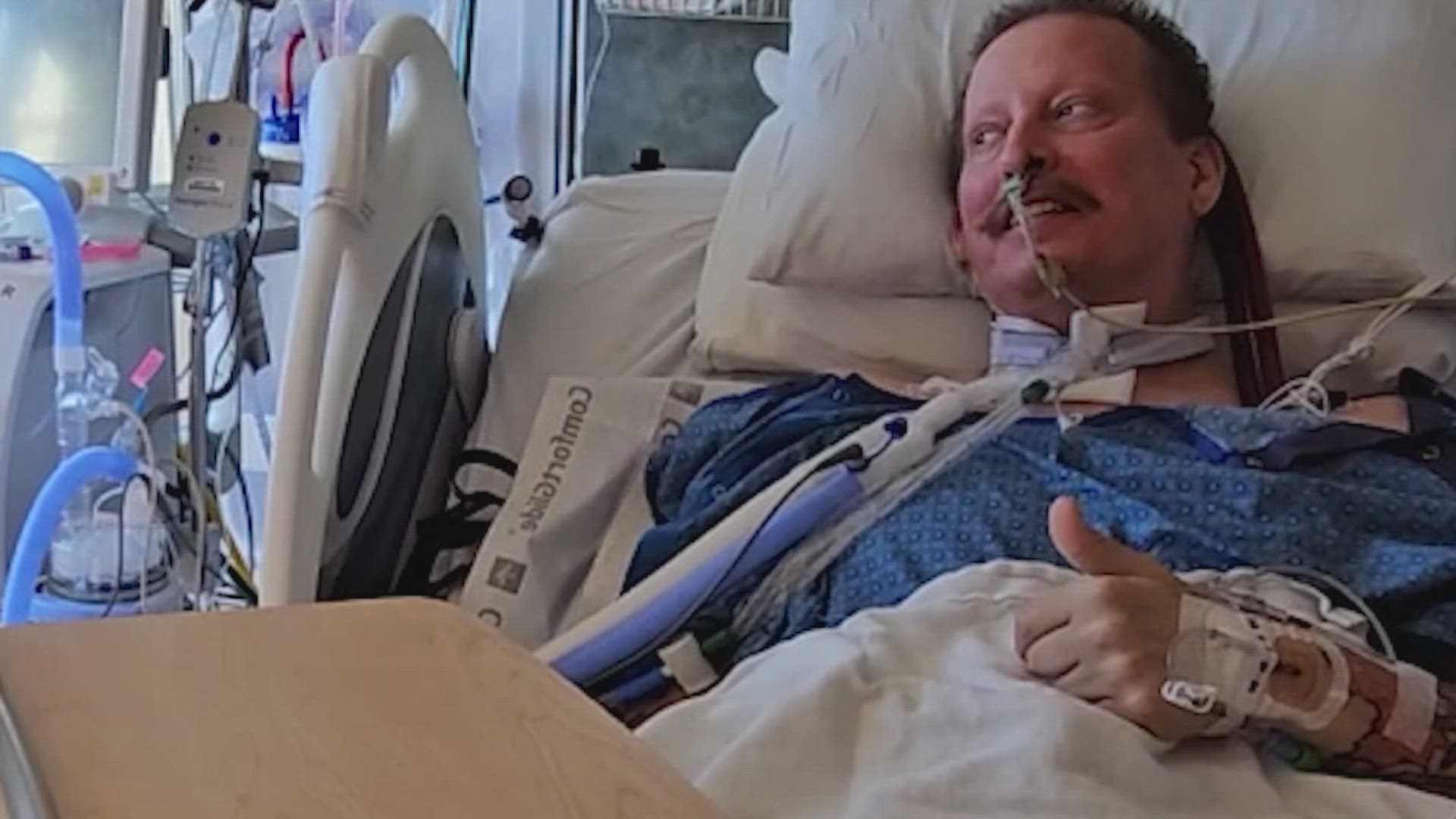SEATTLE — After a Washington veteran of the U.S. Marine Corps returned from his deployment in Iraq, he was diagnosed with a type of cancer that doctors said was caused by harmful chemicals he was exposed to overseas.
Unfortunately, the chemotherapy 44-year-old Andrew Stevens later received caused his lungs to fail. This year, his medical team put him on a life support machine called Extracorporeal Membrane Oxygenation, or ECMO, "which is kind of like external lungs for the body," said his wife Stephanie Rudat. ECMO is not a sustainable option for the long-term, however.
Months later, Rudat said her husband's ICU doctor at Swedish Hospital told them Stevens would need a new pair of lungs to survive and get better.
"The lungs hardened," said Rudat. "They stopped being able to move."
But Rudat told KING 5 that his local team at VA Health Care did not help him get a life-saving transplant here locally.
"The decision was determined by The Lung Transplant Program which is a collaborative program of the VA Puget Sound Health Care System and UW Medicine, where transplant surgery takes place," UW Medicine said in a statement.
"Our doctors reached out. We were denied," said Rudat.
As a result, on Friday, Stevens will be medevacked to Northwestern's transplant center in Illinois, and she and her three boys now need to move there too. This, Rudat said, is already creating even more disruption and instability for their three boys after a tough year.
"Andrew has fought a war honorably," said Rudat. "Now, he's not just fighting for a transplant. Andrew is fighting a system that claims to support him."
The VA covers the cost of his care, but in Washington, the only transplant center they partner with is UW Medicine. According to Rudat, the transplant program rejected Stevens' eligibility for a transplant because of outdated medical guidance: it used to be considered best practice to require that patients have spent five years in remission before a transplant.
"It's a well-intended policy," said Rudat. She explained that the general rule was created out of concern that the cancer could come back during immunosuppression amid the transplant procedure.
Stevens has only been in remission since February. However, as of 2021, the Journal of Heart and Lung Transplantation relaxed their guidance to read, "A transplant may be an option where the risk of recurrence is deemed very low."
"So that they aren't just giving a hard 'No' to people," said Rudat.
She said Stevens' oncologists do not believe his cancer should be a barrier to transplant because his chance of recurrence is low and is highly treatable.
"No one here at Swedish Hospital is in agreement with giving up on a transplant," said Rudat.
However, when Stevens' wife asked his VA Patient Advocate to challenge the refusal, she said they told her that they would not revisit Stevens' case, "regardless of his progress."
"She closed, apologetically, by telling me I should start looking at long-term acute care facilities for Andrew to live out his life," Rudat said.
But Rudat did not give up. Rather, she got a second opinion: a renowned transplant doctor in California told Stevens' healthcare team this, after reviewing his case: “I’m not sure that I would stop him from getting a transplant because of this theoretical risk.“
In addition that doctor in California, the transplant team at Northwestern also said they would be open to evaluating Stevens for a transplant. Ultimately, Northwestern was able to get him in more quickly than anyone else.
"Knowing that there is one of the top lung transplant centers in the United States just down the street from our home-- that wouldn't require even more disruption than what we've already faced this year-- and that the VA isn't pushing to change the policies around this partnership, it hurts even more," said Rudat.
KING 5 asked VA Puget Sound Health Care's team to go on camera and explain, but instead, they responded with a statement, reading in part:
"Veterans with the potential need for a lung transplant are among the highest-risk patients we care for. For this reason, our team of VA Puget Sound and UW Medicine Transplant Center pulmonologists, surgeons, nurses, and social workers carefully assess each person to determine if a lung transplant is the right treatment…
"Determining the best treatment decisions for Veterans with complex conditions requires the integration of several considerations and is something we take seriously and approach with the utmost care."
Now, even though Stevens' sons just started a new school year in Washington, they are in the middle of uprooting their lives to move across the country to help their dad fight for his life.
"When you are a service member, you do not leave anyone behind. You do not leave anyone behind," said Rudat. "And he does not want to leave his family behind."
Stevens' family faces a myriad of new housing, living, and traveling expenses, because he will likely need to be in Illinois for at least a year during his transplant and recovery process. If you would like to help, you can join the hundreds of others who have donated by going to a verified fundraising webpage created in their name.
The Media Relations team at UW Medicine also declined to provide an answer for KING 5's interview request, and instead emailed a statement reading in part:
"A multidisciplinary team assesses each patient to determine if a lung transplant is the right treatment... Each lung transplant center determines their eligibility criteria based on updated medical guidance, studies, and standards, to give the patient the best chance of a successful transplant."

